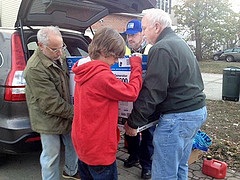 Though official Israeli offers of help to Hurricane Sandy victims have thus far been politely declined by the states most affected by the October 29, 2012 storm, various Israeli non-governmental agencies (NGOs) are working to bring relief to victims and supplies to emergency workers in New York and New Jersey.
Though official Israeli offers of help to Hurricane Sandy victims have thus far been politely declined by the states most affected by the October 29, 2012 storm, various Israeli non-governmental agencies (NGOs) are working to bring relief to victims and supplies to emergency workers in New York and New Jersey.
Roger Parrott, Jacob Parrott and Joel Leyden
(in blue hat) delivering a generator and gas
to a Hurricane Sandy victim on Long Island.
Shahar Zahavi, CEO of IsraAID:
The Israel Forum for International Humanitarian Aid, is leaving Israel on November 9 with a delegation of about a dozen trained rescue volunteers heading to Far Rockaway and Long Beach in New York’s Long Island, and the devastated Atlantic City-Margate area of the Jersey Shore.
“Their mission is to rehabilitate, rescue, bolster morale and bring physical and communal resources in the most effective, organized and expedient way,” says spokeswoman Tova Hametz. “Shahar ran the show in Haiti [during the 2010 earthquake relief mission] so he knows how to do this.”
The delegation aims to identify areas of greatest need and allocate resources to vulnerable populations, such as older people and families with young children who are still without electricity or suffered severe damage to their homes.
Young Israelis and Israeli companies are financing this mission, and partner companies in the United States are supplying the crew with food, water, gasoline, sheets, blankets, clothes and storage facilities to distribute to people evacuated from their homes. Hametz said the IsraAID volunteers would also try to organize and coordinate other rescue and relief efforts in the area.
Ra’anana resident Joel Leyden, who volunteered with IsraAID affiliate
Israel Flying Aid in Haiti following the 2010 earthquake, says Israelis are well prepared to function in emergencies and disasters.
“Unfortunately, that’s the environment we’ve had to adapt to and what makes us excel in places like Haiti, Japan, Turkey and even New York. The real trick here is not so much being able to provide the lifesaving supplies but actually to create a cultural bridge whereby we are able to open a door for our supplies.”